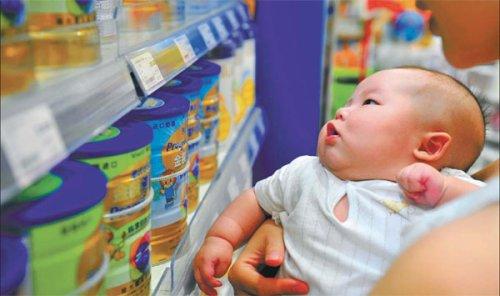
For the last few months here in Hong Kong, if nothing else, my eyebrows have had a good workout, raising frenziedly with headlines like this leaping out at me from the pages of newspapers (local and international).
“Milk Smugglers Top Heroin Courier Arrests in Hong Kong”
“China’s Parents Crave Illegally Imported Baby Formula”
“Chinese moms risk prison if caught smuggling infant formula, but could they stay in Hong Kong?“
and
“Hong Kong is troublesome, says milk powder offender”
Did somebody say ‘Milk powder offender?!’
Admittedly I was a little baffled as to how something so seemingly innocuous like baby food could be the cause of such scandalous headlines.
Then during my latest airport dalliance, a bit like the news headlines every 15 minutes, announcements boomed across the intercom – “Warning: All travellers to China are to take NO more than two tins of infant’s formula across the border!”
That’s two tins, OK!
Message received loud and clear – but just in case you didn’t get it, once through customs you’ll be greeted by this:
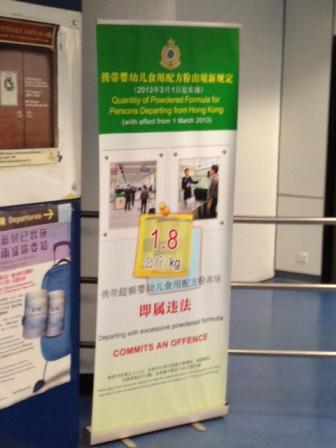
Make no mistake – departing Hong Kong with excessive milk powder is an offence!
It seems baby formula has become a powerful and precious commodity.
Like gold, copper and oil, it needs to be kept under lock and key with demand for the valuable merchandise desperately outstripping supply.
Beware the lurking milk powder thief!
Naturally I had to dig a little deeper to see what all the fuss was about.
I didn’t have to dig too far because it’s an issue that dates back several years and has generated more than its fair share of headaches, not to mention, mass hysteria and heartache.
To cut a long story short, five years ago in China, six babies died and another 300,000 became ill after drinking powdered milk that contained the toxic chemical compound, melamine.
Thousands, upon thousands of babies were hospitalized.
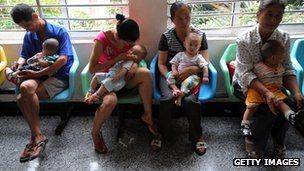
The substance melamine is used to make plastics and fertilisers and gives a false protein level when added to watered-down milk.
The chemical artificially increases the protein-content of milk products, but can also cause kidney failure.
Yep! Pretty serious stuff, definitely worthy of some large-scale headlines don’t you think?
With 81.6-million children under five years old in China (more than the entire population of France) baby’s milk is big business.
Sales of baby formula in the world’s most populous country grew 29 percent to 95.2 billion yuan ($15.4 billion) last year, more than four times the size of the U.S. market.
Breast feeding rates in China are reportedly low — only 28 percent according to a 2012 UNICEF report — mostly due to brief maternity leave, little breastfeeding support and the aggressive marketing of formula. (Formula samples are given at prenatal checkups, free “breastfeeding classes” are held by formula companies and their posters are all over the walls of most hospitals.)
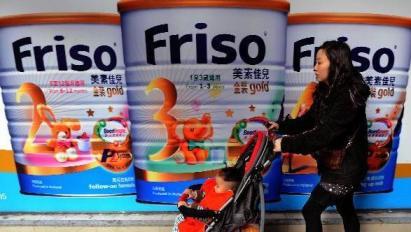
But the melamine scare left a bitter taste in the mouths of residents, that continues to linger to this day.
An ongoing distrust of locally made products means parents are looking elsewhere for their formula fix and going to great lengths to secure safe milk for their babies.
In a country with a perceived lax quality control and production shortcuts, it’s about buying a set of regulations and standards they can trust.
That means Hong Kong, just a hop, skip and a jump away, is bearing the brunt of anxious parents desperate to buy formula from reputable sources.
This mum’s story online highlights the anguish and despair Chinese parents are facing.
“A Chinese woman from Beijing gave birth in a Hong Kong hospital (her husband a HK resident) determined to breastfeed her newborn at any cost, despite wincing in pain with sore, bleeding breasts, she declared it a necessity. Going back to Beijing where no formula is deemed safe, she admitted to having squirreled away a few tins of imported milk powder when she found out she was pregnant – enough for an emergency, she said, but not enough for daily use.”
In an effort to calm the waters, the China Dairy Industry Association says 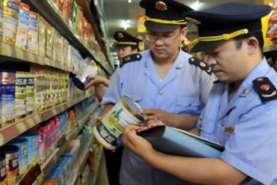
But, the spotlight has shone even more brightly on China’s food supply chain this week with reports ‘rat meat’ is being sold in Shanghai as lamb. The Ministry of Public Security announced – if you’ve ordered lamb or mutton for hotpot in Shanghai over the last four years, there’s every chance you’ve been served rat, fox or mink!
Then this headline came in the South China Morning Post:
“Sale of 40 tonnes of diseased pork sparks police inquiry”
Two people hired by a county government in Fujian province to destroy pigs killed by infectious diseases have reportedly been detained for allegedly processing the carcasses and selling the meat in neighbouring provinces.
Studies last year showed excessive amounts of heavy metals in rice from several regions. In 2005, a fake chicken egg producer’s website boasted producing 1,500 eggs a day out of paraffin wax and algae.
The 2008 milk scandal crippled China’s export economy with at least 11 countries stopping all imports of Chinese dairy products. These latest stories only heighten a general sense of anxiety over food security in China.
Government reassurances are doing little to stop the influx of Chinese people crossing the border into Hong Kong to buy products and it’s making residents a little hot under the collar.
One newspaper quoting “Mainland traders with hand trucks and backpacks frequently clear Hong Kong store shelves of baby formula, small electronics and imported cookies and noodles. This behavior has earned them the nickname “locusts” in Hong Kong.”
Admittedly the surge in Mainlanders snapping up baby powder has made it difficult at times for Hong Kong parents to buy baby formula for their own children. Shelves across the island have been stripped bare of the precious powder.
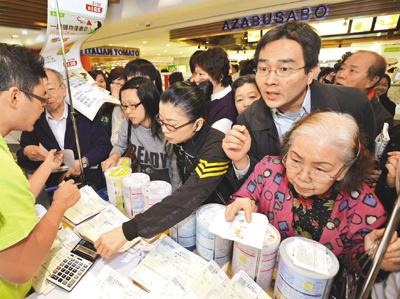
Chinese buying formula in Hong Kong
To demonstrate their anger, nearly one hundred local protesters besieged a drugstore packed with mainland smugglers and shouted the slogan, “Regain Possession of Hong Kong! Give Formula Back to Us.”
It’s become such a sensitive issue in the Fragrant Harbor, a petition has even been sent to the White House! Yes THE White House!!
An anonymous person started the petition on the White House’s “We the People” section, where any appeal that receives 100,000 signatures within 30 days triggers a response from the Obama administration.
It calls for international support and assistance as malnutrition and hunger loom large for the city’s babies.
Some say this is verging on being over the top and has embarrassed Hong Kong, particularly when there are countries who’s children are suffering from serious malnutrition and hunger.
“It is a shame for someone to do a stupid thing like this. It makes the world think that we are very naive.”
Maybe so, but the government isn’t taking it lightly.
Outbound travelers who disobey Hong Kong’s two can rule face hefty fines – a maximum penalty of HK$500,000 and a possible jail term of two years.
But for many, it’s merely a stumbling block not a deterrent.
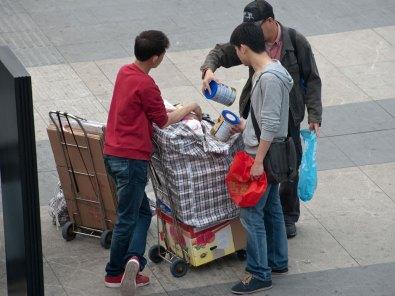
Since the regulations came into play, a syndicate has been cracked with more than 4000 kilograms of baby formula found in a Hong Kong warehouse worth about a million dollars. It was being stored for parallel goods trading purposes.
For border officials in Hong Kong, at the moment, baby formula smugglers are trumping drug smugglers. This year, to date, 879 people have been arrested. Last year, 420 people were arrested for having restricted drugs.
Traders are said to travel across the border several times a day with at least two tins of milk powder each time. The formula is then being sold at a premium with Chinese Mainlanders more than willing to pay an exorbitant price for the liquid gold.
Hong Kong’s not alone in its restrictions on China, over the past year, stores in Germany, the U.K., Australia and New Zealand have put limits on all bulk purchases of formula.
Foreign countries are producing more milk, but say there’s a limit. China’s major milk producer New Zealand was hit by drought in the North Island, dampening production.
In the latest bid to appease both Hong Kong residents and Mainlanders, manufacturers and pharmacies have announced joint measures to guarantee Hong Kong mothers six tins of infant milk formula a month, a move they hope will prompt the government to drop its export curbs.
An extra 1.1 million cans have been pledged by the Infant and Young Child Nutrition Association (formed by the seven big formula brands) on top of the four million tins usually imported into Hong Kong each month.
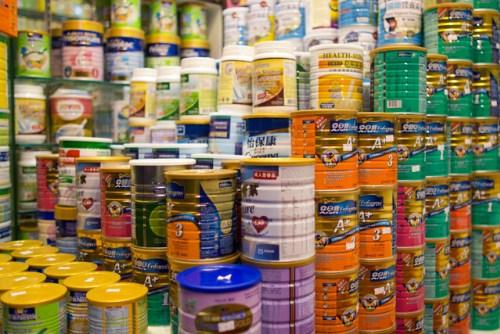
The association says according to the number of babies born in Hong Kong, the 1.1 million cans per month should be sufficient to feed all local babies.
Mainland Chinese media outlets are divided in their opinion on Hong Kong’s milk powder policy. Many say it violates the principle of free trade and it’s sparked fear, outrage and angst on Chinese social media. Some even saying it’s comical…”it’s not gold bars or suitcases stuffed with cash!”
Unfortunately, the formula crisis only fuels the tension between Hong Kong and the Motherland even further. The unrest between the two metropolises likened to a ticking time bomb.
So who’s to blame for this disaster?
Should governments be doing more on all fronts? What about the dairy industry and milk powder manufacturers, are they responsible? Should the focus be on why standards for infant formula are so different across the globe?
What do you think? Is there a formula for success here?

